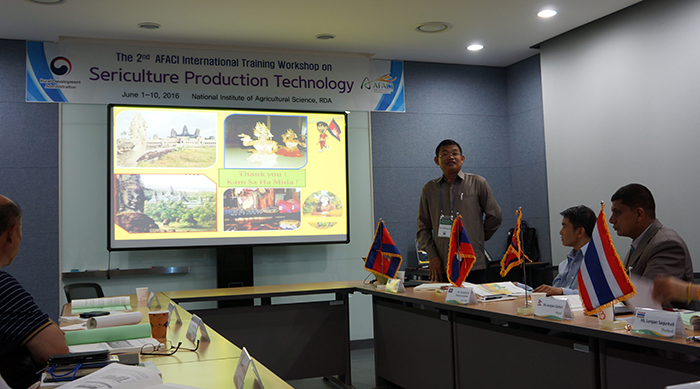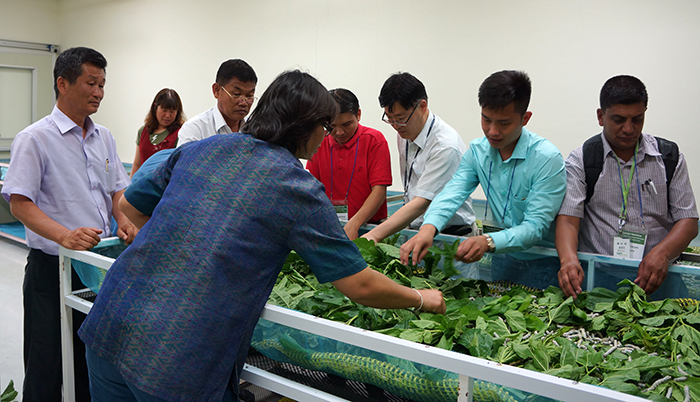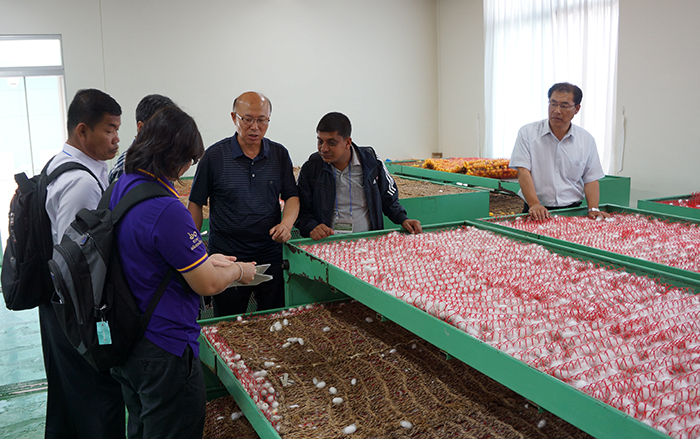-
 Korea.net's 24-hour YouTube channel
Korea.net's 24-hour YouTube channel- NEWS FOCUS
- ABOUT KOREA
- EVENTS
- RESOURCES
- GOVERNMENT
- ABOUT US
View this article in another language
- 한국어
- English
- 日本語
- 中文
- العربية
- Español
- Français
- Deutsch
- Pусский
- Tiếng Việt
- Indonesian
Korea and five Asian countries have shared their knowhow and expertise in sericulture technology and have discussed measures to boost cooperation. Sericulture is the raising of silkworms for the production of raw silk.
The Rural Development Administration (RDA) provided a training workshop on sericulture at the Department of Agricultural Biology at the National Institute of Agricultural Sciences for researchers and related officials from Cambodia, Laos, Nepal, Thailand and Vietnam from June 1 to 10. The educational program was designed to share sericulture technology so that they could boost their productivity.
These countries are all members of the Asian Food & Agriculture Cooperation Initiative (AFACI), which has 14 Asian member-nations.

Program participants attended lectures on how to rear silkworms, artificial hatching technologies for silkworm eggs, and how to cultivate and manage mulberry farms. They learned more about the current state of Korea’s sericulture industry, especially from a functional perspective about Korea’s mulberry tree cultivation technology and usage, the country’s system to protect silkworm eggs and how to feed silkworms. Participants also visited related sites, such as the Agricultural Research & Extension Services Center and the Korea Silk Research Institute.
Southeast Asian countries have good natural conditions for a sericulture industries, as they are hot, they have good soil for mulberry trees and they can harvest their silkworms more than three times per year. However, they have low productivity in producing cocoons due to a lack of sericulture technologies and silkworm varieties. For this reason, as part of its pan-Asian goals, the AFACI decided to establish a cooperative structure for sericulture technology. In line with the AFACI, Korea opened its training course in 2014 to contribute to boosting productivity in the sericulture industry of its Asian neighbors.


By Yoon Sojung
Korea.net Staff Writer
Photos: RDA
arete@korea.kr
The Rural Development Administration (RDA) provided a training workshop on sericulture at the Department of Agricultural Biology at the National Institute of Agricultural Sciences for researchers and related officials from Cambodia, Laos, Nepal, Thailand and Vietnam from June 1 to 10. The educational program was designed to share sericulture technology so that they could boost their productivity.
These countries are all members of the Asian Food & Agriculture Cooperation Initiative (AFACI), which has 14 Asian member-nations.

Sericulture experts from Cambodia, Laos, Nepal, Thailand and Vietnam engage in a discussion during a training workshop on new sericulture technologies hosted by the Rural Development Administration.
Program participants attended lectures on how to rear silkworms, artificial hatching technologies for silkworm eggs, and how to cultivate and manage mulberry farms. They learned more about the current state of Korea’s sericulture industry, especially from a functional perspective about Korea’s mulberry tree cultivation technology and usage, the country’s system to protect silkworm eggs and how to feed silkworms. Participants also visited related sites, such as the Agricultural Research & Extension Services Center and the Korea Silk Research Institute.
Southeast Asian countries have good natural conditions for a sericulture industries, as they are hot, they have good soil for mulberry trees and they can harvest their silkworms more than three times per year. However, they have low productivity in producing cocoons due to a lack of sericulture technologies and silkworm varieties. For this reason, as part of its pan-Asian goals, the AFACI decided to establish a cooperative structure for sericulture technology. In line with the AFACI, Korea opened its training course in 2014 to contribute to boosting productivity in the sericulture industry of its Asian neighbors.


Sericulture experts from Cambodia, Laos, Nepal, Thailand and Vietnam visit silkworm production facilities in Korea as part of a training workshop hosted by the Rural Development Administration.
By Yoon Sojung
Korea.net Staff Writer
Photos: RDA
arete@korea.kr
Most popular
- First hearing-impaired K-pop act hopes for 'barrier-free world'
- Expats could account for 7% of population in 20 years: report
- 'Mad Max' director impressed by 'cinema-literate' Korean viewers
- Show in Italy to present 'thought-filled' Korean craftworks
- Romanian presidential couple visits national cemetery













